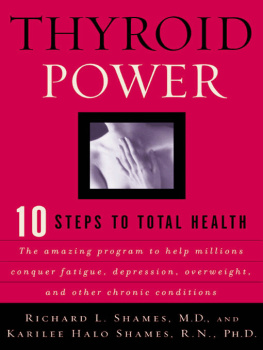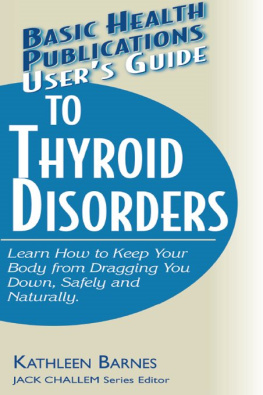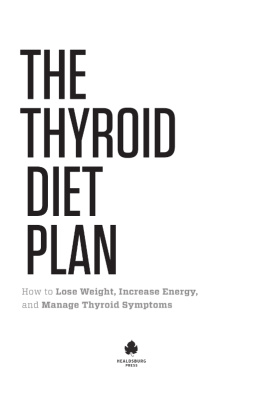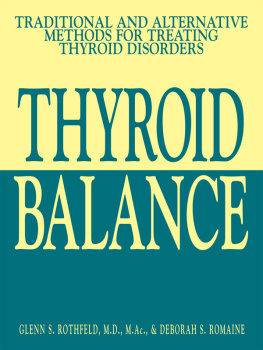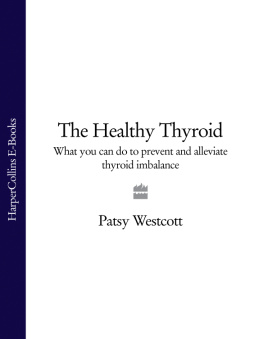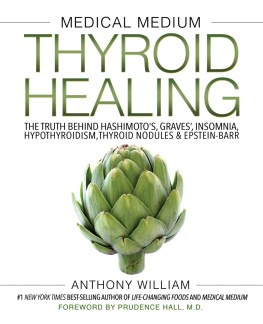Richard dedicates this book to Nathan Becker, M.D., endocrinology professor at UCSF Medical Center, for his many years of influential vision and clarity in advancing the importance of individualized thyroid care. Dr. Beckers refinements of Karilees standard thyroid program led to such improvement in her quality of life that Richard was inspired to successfully incorporate these bold new ideas into his general practice.
Karilee dedicates this book to our three wonderful children: Shauna, Georjana, and Gabriel, for their laughter, wisdom, and loving support. May they continue to inspire all whose lives they touch.
Both authors dedicate this book to the millions who struggle with subtle low-thyroid conditions, in the hope that they find greater healing and wellness.
This book is written as a source of information only. The information contained in this book should by no means be considered a substitute for the advice of a qualified medical professional, who should always be consulted before beginning any new diet, exercise, or other health program.
All efforts have been made to ensure the accuracy of the information contained in this book as of the date published. The authors and the publisher expressly disclaim responsibility for any adverse effects arising from the use or application of the information contained herein.
Contents
The authors gratefully acknowledge the following people for their invaluable contributions to this project:
Walter Maack, M.D., and David Chipkin, M.D., for their initial ideas regarding a needed book about thyroid, and Stuart Zoll, O.M.D., Centre for Preventive Medicine in Boca Raton, Florida, for his support during the final editing phase.
Michael Wanger, of Wanger Associates Video Productions in Kentfield, California, for his encouragement of the authors multimedia efforts to share their technical information effectively.
Julia Ross, M.A., of Recovery Systems of Mill Valley, California, for her insistence that such a book would be valuable for the many people struggling with addictions, overweight, and eating disorders.
Associates from the American Holistic Nurses Association, especially Barbara Dossey, R.N., M.S., F.A.A.N., Lynn Keegan, R.N., Ph.D., F.A.A.N., plus Susan Luck, R.N., M.S., and Judy Lane, R.N., F.N.P., for their eternal friendship and support in our professional growth.
Karilees colleagues at the Florida Atlantic University College of Nursing, particularly Eleanor Schuster, Ph.D., R.N., Debera Thomas Ph.D., R.N., and our Dean Anne Boykin, Ph.D., for their support in this educational project.
Faith Hamlin, our encouraging agent at Sanford Greenburger Associates, whose faith enabled this book to come to life.
Lana Thompson, of Vesalius Editing, in Boca Raton, Florida, who laboriously corrected and revised the manuscript.
Toni Sciarra, our careful and exacting senior editor at HarperCollins, whose patience and humor have guided our work.
In addition, we offer special gratitude to the women in Karilees Thyroid Recovery Groups, for their long-term commitment to voicing and improving the many personal aspects of low thyroid conditions for themselves and for others.
Hypothyroidism is undoubtedly the most common disorder of thyroid function. It affects both sexes and all ages; it may be overt or subclinical; the spectrum of severity is broad. At one extreme are patients who have a few symptoms and signs. At the other extreme are patients in coma. Hypothyroidism can be subclinical for many years, particularly in patients with autoimmune
Although we are beginning to understand immune mechanisms, we do not yet fully understand autoimmune thyroid disease. Hashimotos disease is primarily cell-mediated immune destruction of the thyroid gland. In the less common Graves disease (also called thyrotoxicosis), a circulating antibody drives the thyroid to hyperfunction, out of the control of pituitary TSH feedback. Graves disease and Hashimotos disease frequently coexist in families. Although the tendency to develop these autoimmune disorders is almost certainly inherited, we do not yet know how the malady is inherited.
What frequently confuses the average clinician is that patients often experience other autoimmune endocrinopathies simultaneously. Addisons disease (adrenal insufficiency), Type 1 diabetes (insulin dependent), autoimmune gonadal failure, hypoparathyroidism, and pituitary failure are not rare partners. Several years ago, Phyllis Saifer, M.D., and I coined the term APICH Syndrome, which introduced associative non-endocrine maladies with the previously outlined endocrine disorders. While clinically important, these relationships tantalized more than informed us about the basic mechanisms of autoimmunity.
Thyroid disorders are coupled maladies: localized inflammation with generalized flu-like symptoms, and resultant hormone excesses or deficiencies. It is no surprise that the patient, as well as the physician, is confused.
Amid this confusion, treatment with thyroid hormoneto the point of suppressionis often diagnostic as well as therapeutic. These remarks would be considered heresy by academicians. Physicians and patients should, however, remember that academicians are often passionate, idealistic, eccentric, quarrelsome, and self-serving. They often do research, publish, teach, but rarely see or care for thyroid sufferers.
Regarding actual patient care, a trial of thyroid hormone therapy was often used to good advantage in the past. Today, with sensitive laboratory studies, such as TSH assays, our presumed ability to diagnose thyroid disease has encouraged the physician to treat the laboratory data instead of the patient. Consequently, empiric treatment with thyroid hormones has fallen out of favor.
Nevertheless, sensible, cost-effective treatments of widespread thyroid disorders remain an important concern of the physician, not least because the patient often presents with vague complaints that easily can be misdiagnosed. Patients who present with fatigue, depression, and subtle cognitive defects are frequently dismissed, discouraged, and mistreated. Ive spent many years treating these patients with thyroxine () with much success.
Regards and best wishes for your success as well,
N ATHAN B ECKER, M.D., F.A.C.E., F.A.C.P.
Assistant Clinical Professor of Medicine
University of California at San Francisco
Although extremely common, low thyroid is largely an unsuspected illness. Even when suspected, it is frequently undiagnosed. When it is diagnosed, it often goes untreated. When it is treated, it is seldom treated optimally.
This book is intended to correct some of these shortcomings. Show this book to your health providers. Review some of the references. Ask questions and demand appropriate action. You deserve to feel strong, be healthy, and live fully.
As a doctor-nurse team, we have spent more than twenty-five years helping people with the frustrating condition of borderline low thyroid. We became involved not only because so many of our patients were burdened with this life-sapping illness but also because Karilee and our three children have this genetic challenge.
This unusual book is the result of insight from a variety of sources, including other books, journals, conferences, and consultations with top university specialists. It is the first of its kind to provide an actual step-by-step program that allows you to tackle this complex and deceptive syndrome one layer at a time. Consider it a long, personal visit with a caring, prevention-oriented practitioner. Let it guide you on a journey from a set of diverse symptoms, seemingly unconnected, to a definite diagnosis and effective treatment.

